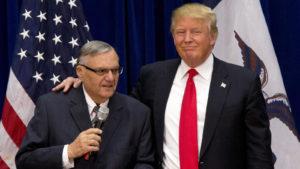Commentary: Trump’s pardon of Arpaio sets a dangerous course

By Raja Krishnamoorthi
September 6, 2017, 4:04pm
President Donald Trump’s recent pardon of former Arizona Sheriff Joe Arpaio — who was convicted of criminal contempt for ignoring a federal court order to stop racially profiling Latinos — has been widely criticized by Democrats and Republicans.
The Arpaio pardon sends a loud warning signal. It was issued while the sheriff was still awaiting sentencing for his conviction. It did not go through the normal pardon process, which includes lengthy reviews by the Justice Department and the White House counsel’s office. We now know that this president will use his pardon power to aggressively protect his political allies. But we may never know how far his use of that power will extend.
The truth is that President Trump could already have pardoned members of his family, campaign staff and advisers for any crimes they may have committed during the campaign or in the White House. In fact, the president could already have pardoned himself and we wouldn’t even know.
Transparency and openness are critical to our democratic process and to making decisions about our leaders. But where is the transparency when a president can issue pardons to anyone — including his family and close advisers — without ever telling the public?
I have introduced legislation that would make such pardons public — by requiring their publication within three days of being signed.
For months, we have seen revelation after revelation about the Trump administration’s entanglement with Russian entities. It has been reported that special counsel Robert Mueller has two grand juries looking into Trump campaign aides, family members and their Russian contacts.
The Washington Post reported in July that Trump asked his legal team whether his pardon powers extend to White House aides, family members or even himself. Although the Office of the Pardon Attorney handles most pardons, the president retains the right to issue pardons to any person, at any time, for any cause, and without any guarantee that all pardons will be made public. Furthermore, an individual the president has secretly pardoned is under no obligation to make the fact public until a charge is brought.
My proposed Presidential Pardon Transparency Act would mandate that all pardons, whether from the president or the Office of the Pardon Attorney, be made publicly available on the White House website three days after they are issued.
This legislation quickly attracted two dozen co-sponsors who share my concern that secret presidential pardons could impede current and future investigations of public officials and White House wrongdoings.
Secret, pre-emptive pardons would only make it harder for investigators to find the truth and for Americans to retain faith in their government. As is often stated, ours is a government of laws and not men. No one is above the law — not even a president. But the possibility of secret pardons turns that principle on its head. That’s why we must move quickly to bring any such pardons to light.
Raja Krishnamoorthi represents the 8th Congressional District of Illinois. A Democrat, he is a member of the House Oversight and Government Reform Committee.
